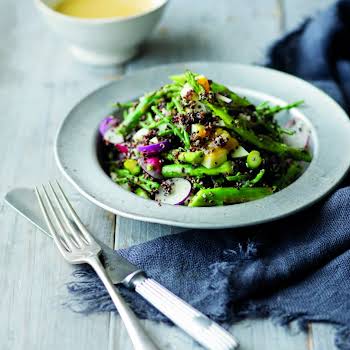
Health Check: What are prostaglandins and how do they affect my period symptoms?
By Erin Lindsay
10th Dec 2020
10th Dec 2020
If you find yourself suffering with symptoms like cramping, sore eyes, nausea and UTIs around your period, getting educated about prostaglandins could be the key to relief
When your time of the month rolls around, every woman gets used to certain signs of its arrivals. Irritable moods, building cramps, and waves of nausea are all ways to recognise that a period is on its way, as well as the number of unique symptoms that women experience individually. But why do period symptoms affect us in this way, and is there a natural way to improve them?
What are prostaglandins?
To understand why our periods affect our bodies this way, we need to look at what’s going on inside. The pain that happens in our bodies around our periods are largely due to chemicals called prostaglandins — a hormone-like lipid that promotes inflammation. Prostaglandins are produced by cells as a way to deal with injury and illness, and are involved in the control of ovulation and the menstrual cycle in women.
Shortly before your period begins, the cells that form the lining of your uterus produce large amounts of prostaglandins, and release them when the cells break down during menstruation. The prostaglandins constrict the blood vessels in the uterus, causing contractions (cramps), and some of them enter the bloodstream and travel to other areas of the body, which can result in nausea, headaches and other inflammatory symptoms. A particular type of prostaglandin is also linked to urinary tract infections, which can explain if you suffer with these infections around the time of your period.
Studies have shown that women who suffer with severe pain during menstruation are more likely to release high levels of prostaglandins during this time.
What can be done to treat it?
Since prostaglandins encourage inflammation, it makes sense that anti-inflammatory pain relief like ibuprofen can be used to treat its symptoms. But as many of us know, often taking a dose of Nurofen is not enough to relieve severe period pain.
A different way to approach symptom relief is to treat it at the source. If you produce a large number of prostaglandins during menstruation, it may be worth trying to reduce inflammation in your body in other ways.
Oral contraceptives are a tried and tested shield against period pain, as they inhibit the growth of the endometrial cell layer, and so, reduce the number of prostaglandins being produced by the uterus. However, oral contraceptives are not a suitable path for every woman, and it’s important to talk to your doctor before trying any new medication.
Modifying your diet, especially around the time of your period, can also have positive effects. A low fat, high fibre diet has been shown to reduce estrogen levels in the body, and therefore help with inflammation levels during menstruation. Staying away from animal products and other inflammatory foods like white bread and pasta, and sticking to fruits and vegetables, grains and beans will have a significant effect on reducing your inflammation levels (not to mention energy levels).
If your period is causing severe effects to your physical and mental health, consult your doctor before making any changes to your medication or diet
Read more: ‘Trust me, guys’: The sell-out post that prompted Kardashian fans to finally turn on their idol
Read more: The faces behind the hospital overcrowding: ‘Chemotherapy is brutal but cancelling it on my four-year-old is torturous ‘
Read more: Intermittent fasting: everything you need to know about Google’s most searched diet trend























